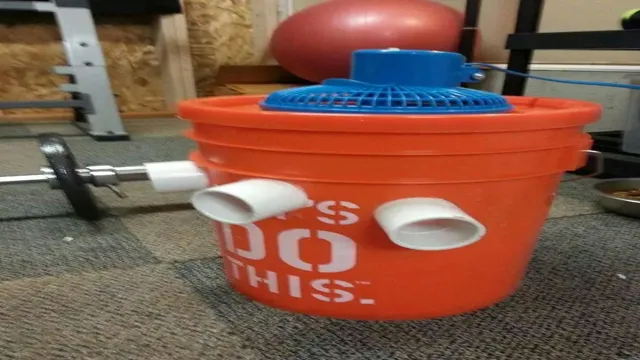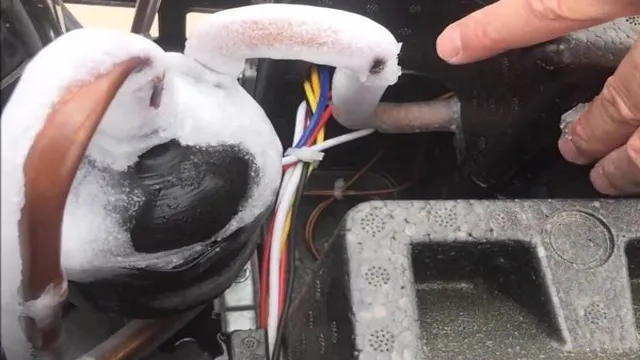Have you ever experienced your RV air conditioner freezing up? It can be a frustrating problem, especially during hot summer days on the road. The good news is that this issue is quite common in RV air conditioners, and it can be fixed with some simple steps. In this blog, we will go over why RV air conditioners freeze up, what causes it, and what you can do to prevent it from happening again.
Understanding the root cause of the problem can help you take the necessary action to avoid RV air conditioner freeze-ups in the future. So, let’s dive in and get to the bottom of this issue!
Causes of Freezing
If you notice that your RV air conditioner is icing up, there could be several reasons why. One common cause is a dirty air filter. If the filter becomes clogged with dirt and dust, the air can’t flow properly, causing the evaporator coil to freeze up.
Another possible cause is low refrigerant levels. Refrigerant leaks can occur over time, causing the unit to run low on refrigerant and resulting in freezing. Additionally, if the airflow is restricted, the evaporator coil can also freeze up.
This could be due to blockages in the ducts or vents, or a problem with the blower fan. Ultimately, any of these issues can cause your RV air conditioner to freeze up, leading to a less efficient operation and potentially costly repairs. Regular maintenance and cleaning can help prevent these problems and keep your RV AC running smoothly.
Low Refrigerant Levels
If you’ve noticed that your refrigerator is freezing up or not keeping your food cold, one possible culprit is low refrigerant levels. Refrigerant is a chemical that removes heat from the air inside the fridge and helps to keep items cool. When the refrigerant levels are low, the compressor has to work harder to keep the fridge cold, which can cause it to freeze up.
There are several reasons why refrigerant levels may be low, such as a leak or a malfunctioning component in the cooling system. If you suspect low refrigerant levels, it’s essential to have a professional diagnose and repair the issue promptly. Neglecting the problem could cause more significant damage to your fridge and even pose a safety hazard.
So, if you’re experiencing freezing or other issues with your fridge, don’t wait to get it checked out by a professional.

Dirty Air Filters
Dirty Air Filters Air filters play an essential role in the functioning of your HVAC system. One of the main causes of freezing in your air conditioning unit is dirty air filters. When air filters become clogged with dirt, dust, and other debris, air doesn’t flow through the system as efficiently as it should.
This can cause the evaporator coils to freeze, leading to a variety of issues such as reduced cooling capacity, increased energy bills, and potential damage to the compressor. Regularly changing or cleaning your air filters can prevent this issue and keep your air conditioning unit functioning properly. Although it may seem like a small task, performing this maintenance regularly can save you big headaches down the line.
So, remember to keep your air filters clean to prevent your air conditioning unit from freezing up!
Blocked Airflow
When it comes to your HVAC system, one of the most common causes of freezing is blocked airflow. If there is not enough air flowing through your system, it can cause the coils to freeze over. This can be caused by a number of things, such as clogged filters or ducts, damaged fans, or closed registers.
Without proper airflow, your HVAC system will not be able to properly regulate the temperature in your home, leading to reduced efficiency, higher energy bills, and potentially costly repairs. Ensuring that your filters are clean and your ducts are clear is crucial in preventing blocked airflow and keeping your HVAC system running smoothly. If you suspect that your system may be freezing due to blocked airflow, it is important to take action before the problem worsens.
Preventing Freezing
If you own an RV, you may have encountered the issue of your air conditioner freezing up. This can be a frustrating and uncomfortable experience, especially during hot summer months. There are several reasons why an RV air conditioner may freeze up.
One common cause is a dirty air filter, which can restrict airflow and cause the evaporator coil to become too cold. Another culprit could be low refrigerant levels or a malfunctioning thermostat. To prevent freezing, make sure to regularly clean or replace your air filter and maintain proper refrigerant levels.
It’s also important to keep the temperature consistent and avoid setting your thermostat too low. By taking these measures, you can ensure a comfortable and properly functioning air conditioner in your RV.
Regular Maintenance
Regular maintenance is essential for preventing freezing of pipes during the cold winter months. One of the most important steps you can take to keep your pipes from freezing is to insulate them properly. Insulating pipes can help keep them warmer, which in turn prevents freezing.
You can also try to keep the temperature in your home above freezing to keep pipes from freezing. This can be achieved by setting your thermostat to a minimum temperature of 55 degrees Fahrenheit. Additionally, you should consider allowing faucets to drip slowly during the night to keep water flowing through the pipes, preventing freezing.
Installing a heat tape on pipes that are exposed to colder temperatures is also a great way to prevent freezing. With these simple maintenance practices in place, you can ensure that your pipes stay safe and functional all winter long. Remember, prevention is key, so don’t wait until it’s too late to take action.
Proper Insulation
During the winter, your home’s insulation becomes more important than ever. One of the biggest concerns during this time of the year is preventing frozen pipes. Proper insulation can greatly reduce this risk.
Insulation helps keep the warm air in and the cold air out, which helps prevent heat loss and keeps water flowing through the pipes. If your pipes freeze, they can burst, leading to a costly and messy situation. To prevent this, check your insulation to ensure it is up to par.
Make sure your attic, basement, and walls are properly insulated to keep your pipes safe from the freezing temperatures. Consider adding more insulation if you notice any drafts or cold spots in your home. By taking these steps, you can prevent freezing and avoid any costly repairs.
Thermostat Control
When winter comes, one of the biggest concerns for homeowners is preventing their pipes from freezing. This can lead to burst pipes and costly water damage. One of the easiest ways to prevent this is by controlling your thermostat.
Setting the thermostat between 55-60 degrees Fahrenheit while you’re away from home can help prevent freezing. It may seem like a chilly temperature, but it’s enough to keep your pipes from freezing. You can also leave cabinet doors under sinks open to allow warm air to circulate around the pipes.
Additionally, make sure all exterior doors and windows are closed securely to prevent cold air from entering your home. By taking these simple steps, you can avoid the hassle and expense of dealing with frozen pipes this winter season.
When to Call a Professional
If you’re experiencing a frozen air conditioner in your RV, it’s essential to understand the reasons behind it. A common cause is a dirty or clogged air filter, which can limit airflow and cause the evaporator coil to freeze. Another cause could be a refrigerant issue, which occurs when there’s not enough refrigerant in the system.
Under-filled refrigerant can cause uneven cooling, leading to frozen coils. It’s also possible that the evaporator coil itself is dirty or damaged, preventing proper airflow and causing the unit to freeze up. If you’re unsure of the cause of your frozen RV air conditioner, it’s best to call a professional.
They can inspect your unit, identify any issues, and make the necessary repairs to ensure it’s running correctly. Don’t suffer through a sweltering hot RV trip- call in a professional to diagnose and repair your frozen air conditioner.
Complex Issues
When it comes to complex issues, knowing when to call in a professional is crucial. Whether it’s a personal issue or a problem with your car or home, trying to solve a complex problem on your own can often lead to more chaos and headache. In some cases, it may even cause more harm than good.
Professionals have the education, training, and experience needed to navigate complex issues in a safe and effective manner. While it can be tempting to save money by taking a DIY approach, it’s important to weigh the potential risks and benefits. Sometimes, the cost of fixing a mistake made while attempting to solve a complex issue on your own can be higher than the cost of simply hiring a professional from the start.
Whether it’s a medical issue, legal matter, or home repair, know when it’s time to bring in an expert to ensure the best possible outcome.
Lack of DIY Knowledge
Sometimes, despite our best efforts, we run into home improvement projects that seem beyond our DIY knowledge. Whether it’s a leaky pipe or an electrical issue, knowing when to call a professional can save you a lot of trouble, money, and frustration in the long run. Engaging a professional electrician, plumber, or handyman may be necessary if you lack the necessary knowledge or experience to tackle a project.
While it’s tempting to try and save money by doing it yourself, the risks of causing further damage or injury may outweigh the potential savings. Not only that, but professionals have the right tools, experience, and knowledge to troubleshoot and fix problems quickly and efficiently. Don’t be afraid to ask for professional help when you need it – it’s an investment that pays off in the long run.
Conclusion
In conclusion, the reason your RV air conditioner freezes up is like a classic case of winter in July – it’s just not natural! But in all seriousness, there are a few common culprits that can contribute to this icy issue. It could be due to low refrigerant levels, a clogged air filter, a faulty thermostat, or even incorrect installation. Whatever the cause, it’s important to address the problem ASAP to prevent further damage and ensure you don’t end up with a literal ice box on your next camping trip.
So don’t let your AC freeze over – take action and stay cool all summer long!”
FAQs
What are the common causes of RV air conditioner freeze up?
The common causes of RV air conditioner freeze up are low airflow, dirty air filter, low refrigerant levels, and malfunctioning thermostat.
How can I prevent my RV air conditioner from freezing up?
To prevent your RV air conditioner from freezing up, make sure to clean or replace the air filter regularly, ensure adequate airflow by keeping vents open and unobstructed, have the refrigerant levels checked and maintained by a professional, and check the thermostat for proper functioning.
What should I do if my RV air conditioner freezes up?
If your RV air conditioner freezes up, turn off the unit immediately and allow it to thaw completely before turning it back on. Then, check for common causes like low airflow or dirty air filter, and have a professional inspect the system for any underlying issues.
Can a faulty thermostat cause RV air conditioner freeze up?
Yes, a faulty thermostat can cause RV air conditioner freeze up by triggering the compressor to run longer than necessary, leading to excessive cooling and freezing up of the evaporator coils. If you suspect a faulty thermostat, have it checked and replaced by a professional.

